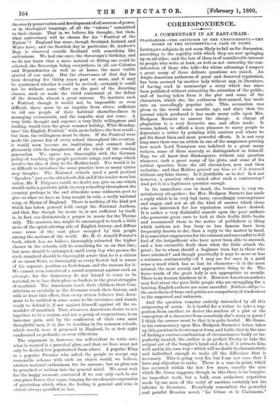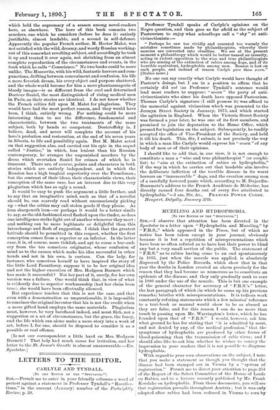CORRESPONDEN CE.
SCORN OF THE SUCCESSFUL-A CASE IN POINT. LITERARY subjects do not seem likely to fail US for discussion, according to the rapidity with which they are now springing up on all sides ; and the last of them is of considerable interest
to people who write at least, as well as not unworthy the con- sideration of those who talk—for whose advantage I suspect a great many of these delicate questions are raised. An Anglo-American authoress of great and deserved reputation, has been accused by another lady without any, in literature, of having read in manuscript a story which has since been published without attracting the attention of the public, and of having taken from it the plot and some of the characters, which she, the authoress first-named, has made into an exceedingly popular tale. This accusation was given to the world some months ago, and since then the journal which produced it has made many calls upon Mrs. Hodgson Barnett to answer the charge. A charge of plagiarism is a very favourite one, and often made. It seems, indeed, to afford a keen pleasure to many people to depreciate a writer by pointing with anxious zeal where he got his finest lines and most powerful effects. It is not very long since there was an article in one of the magazines proving how much Lord Tennyson was indebted to a great many writers, some of them scarcely so distinguished as himself. Nay, we all know that Shakespeare, without any question whatever, took a great many of his plots, and some of his noblest speeches, from the old chroniclers, now and then verbatim : and that Moliere prenait son, bien oh il le trouvait without any false shame. Is it justifiable so to .do ? Is it not however, a question often raised after such a controversy? And yet it is a legitimate question enough.
In the immediate case in hand, the business is very un-
satisfactory altogether ; for Mrs. Hodgson Burnett has made a reply which is in very bad taste, exceedingly contemptuous and angry, and not at all the kind of answer which those who are interested for her reputation could have desired. It is rather a very disdainful assault upon the poor authors who persecute great ones to look at their feeble little books and recommend them to the notice of publishers (a thing which authors not less busy or less famous have been frequently known to do), than a reply to the matter in hand. It is somewhat ungenerous for the eminent and successful to fall foul of the insignificant who have never been able to succeed, and a less excusable fault than when the little attack the great ; for to whom should a beginner turn but to those who have attained ? and though practically it may be more or less a nuisance, sentimentally—if I may use for once in a good sense a word which has so lost its character—it is the most natural, the most seemly and appropriate thing to do. The fierce wrath of the great lady is not appropriate or seemly. There is no human kindness in it. However American authors may feel about the poor little people who are struggling for a hearing, English authors are more merciful. Noblesse oblige !- the mere facts of fame and genius are compulsory of tenderness to the unproved and unknown.
And the question remains entirely untouched by all this
outpouring of scorn. Is it lawful for a writer to take a sug- gestion from another, to derive the nucleus of a plot or the conception of a character from somebody else's story or poem ? I think the answer must be that it is quite lawful. Mr. Gosse, in his commentary upon Mrs. Hodgson Burnett's letter, takes up this question in its strongest form, and holds that in the case of finding a curious combination of circumstances badly or im- perfectly treated, the author is at perfect liberty to take the subject out of the bungler's hand and do it, if it attracts him, well, and in his own way—which will no doubt be characteristic and individual enough to make all the difference that is necessary. This is going very far, but I am not sure that I have any objection to make. There is a case in point, which has occurred within the last few years, exactly the case which Mr. Gosse suggests, though in this there is no bungler, no imperfect work, but a bold, even audacious repetition made by one man of the motif of another, certainly not his inferior in literature. Everybody remembers the powerful and painful Russian novel, "Le Crime et le Ch'atiment,"
which held the supremacy of a season among novel-readers here, as elsewhere. The hero of this book commits two murders, one which he considers (before he does it) entirery justifiable, almost laudable, and a second in self-defence. Apparently the popular French author, M. Hector Malot, was not satisfied with the wild, dreamy, and wordy Russian working- out of this somewhat revolting subject, and accordingly he took it up and treated it over again, not shrinking from an almost complete reproduction of the circumstances and events, in the book which he calls "Conscience." No two books could be more unlike. The Muscovite, with his wild, fantastic horrors and com- punctions, drifting between concealment and confusion, his life a mere feverish dream, his every object and purpose shattered, and the whole world become for him a mere phantasmagoria of bloody images—is as different from the cool and determined Docteur Saniel, the most distinguished of rising medical men in Paris, as their stories are identical. I do not know whether the French critics fell upon M. Malot for plagiarism. They would have had the most perfect reason, and they would have been, I think, entirely wrong. For nothing could be more interesting than to see the difference, fundamental and -characteristic, between the two treatments of the same subject, both by hands so competent. Dostoleffsky is, I believe, dead, and never will complete the account of his hero's probation and restoration, at the end of his seven years in Siberia, to life and possibility again. But M. Malot acted on that suggestion also, and carried out his epic in the sequel called "Justice," in which, less lenient than his Russian 'contemporary, he avenges the unpunished murders by the -doom which overtakes Saniel for crimes of which he is innocent. There are, of course, points and characters in both -stories which are entirely independent, and in which the Russian has a high tragical superiority over the Frenchman ; but the contrast of their ideas, their characteristic views, their conception of the same case, has an interest due to this very plagiarism which has so ugly a sound.
It would be easy to push the argument a little further, and to say that an imaginative mind, such as that of a novelist mhould be, can scarcely read without unconsciously picking – what the critics may call stolen goods if they please. As iron sharpeneth iron—or perhaps it would be a better simile to say, as the old-fashioned steel flashed upon the tinder, so does one intelligence strike light out of another whenever they meet : and nothing can be more legitimate or delightful than this interchange and flash of suggestion. I think that the greatest latitude should be permitted in this respect, whether the first conception comes from a superior or an inferior. In the latter But experience teaches that this is not the case, and that even with a demonstration so unquestionable, it is impossible to convince the original inventor that his is not the credit when a more gifted hand employs the same materials. Plagiarism must, however, be very barefaced indeed, and must filch, not a suggestion or a set of circuinstances, but the grace, the fancy, and the life which can alone make a mere story into a work of art, before I, for one, should be disposed to consider it as a possible or real offence. [Is not our correspondent a little hard on Mrs. Hodgson Burnett ? That lady had much cause for irritation, and her letter to the St. James's Gazette is almost unanswerable.—En. Spectator.]



































 Previous page
Previous page